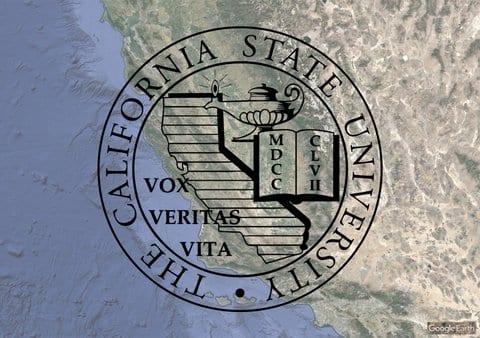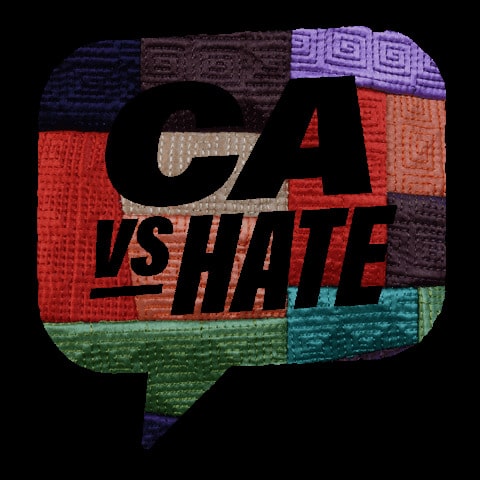
14 Nov EdSource: Cal State Leaders Look to Reduce Tension, Hate Incidents on Campus

(California State University / Google Earth via Bay City News)
By Ashley A. Smith
EdSource via Bay City News
With tensions still high on college campuses over the Israel-Hamas conflict in the Middle East, California State University officials are offering resources and engaging with more students to ease the mood on campuses.
“The CSU condemns in the strongest terms terrorism, including the horrific acts committed by Hamas on Oct. 7,” Cal State Chancellor Mildred Garcia said during a trustees meeting Tuesday last week.
“They are hatred and senseless acts of violence, and they are antithetical to our core values. The loss of innocent life in Israel and the Gaza Strip is heartbreaking, and our deepest and most heartened sympathies are with all of those affected by this horrific tragedy.”
The chancellor’s office also delivered a report Wednesday to the CSU board of trustees highlighting hate crimes and incidents that took place last year, while emphasizing the work it was doing to confront bias and extremism across the nation’s largest public university system. The report gave the trustees a chance to learn what campuses and the chancellor’s office are doing now to address on-campus conflicts, rallies and incidents related to the Middle Eastern conflict.
The number of hate incidents reported within the Cal State system is relatively low across the 23 campuses with more than 460,00 students and 56,000 faculty and staff. However, there was a slight uptick in incidents from 2021 to 2022. As of Dec. 31, 2022, the most recent data available, 13 hate crimes and six acts of violence related to hate were committed across the CSU system. The numbers reflect that six more incidents of hate and violence were committed last year than the previous year.
Melinda Latas, a CSU director who is in charge of campus safety compliance and disclosure for the university system, said hate violence includes incidents such as property destruction and verbal threats of force, or physical violence against a person or group of people, that do not meet the definition of a hate crime under California law.
The most common incident type was physical assaults, followed by intimidation and other threats of physical harm, Latas said, adding that bias was most commonly based on sexual orientation, followed by race and ethnicity.
The increase from 2021 is also likely due to fewer on-campus incidents reported during 2020 and 2021 because of the Covid-19 pandemic, Latas said, adding that for 2023, most campuses so far have seen no increase in hate incidents.
Latas said CSU campuses want to be an example and leader for other universities over how to handle heightened tensions over religious, racial and other political topics. The chancellor’s office said campus leaders have offered support to Jewish students and Hillel houses, as well as Palestinian and Muslim student groups. Counseling services are available, and campuses are encouraging people to report bias incidents or discrimination.
A preliminary review of hate crimes on the San Jose State campus since Jan. 1 reveals only two incidents were reported. Following the Hamas attack on Israel in early October, the campus also hosted two peaceful protests and rallies, each with diverging points of view, said Cynthia Teniente-Matson, SJSU president.
“Some found (the protests) controversial and had the potential to lead to hate-based disruptive activity,” she said. “The campus took precautionary steps.”
Those steps included working with local law enforcement and activating plans for public safety threats.
“Fortunately, we didn’t have to call on them,” Teniente-Matson said, adding that she’s been consistently engaging with students, faculty, staff and community leaders since the Middle East conflict reignited.
She said that the nature of incidents reported on the South Bay Area campus since Oct. 7 have been “mostly fears and concerns about personal safety, which I and other members of my cabinet have taken seriously and responded with prudence.” The University Police Department increased the number of officers and patrols on campus and investigated reports of suspicious circumstances.
According to Cal State San Bernardino’s Center for the Study of Hate and Extremism, violence targeting people of different religions has been increasing nationally. A 2023 report from the center found that religion-targeted hate crime reports increased by 27% in major American cities in 2022, with 470 religious hate crimes targeting Jewish people and 50 targeting Muslims.
The report explained that antisemitism has grown nationally in recent years due to a spread in conspiracism, religious nationalism and anti-government sentiment.
“There is widespread concern that these numbers could dramatically increase with the response we are seeing to events in the Middle East right now,” said Rafik Mohamed, CSUSB provost, adding that Black Americans remain the most frequently targeted group of hate crimes.
Hate crimes against Asian Americans have also increased since the start of the pandemic, he said.
“These aren’t just individual acts of hate, but fundamental attacks on our democracy,” Mohamed said. “Religion-oriented attacks are disturbingly on the rise, as are attacks based on gender identity and sexual orientation.”
To report a hate incident or hate crime and get support, go to CA vs Hate.






No Comments